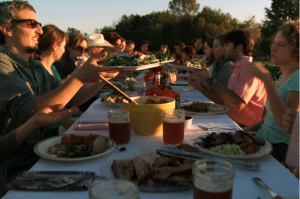A shaggy haired man perches in a little wooden shack, camouflaged head to toe, arms cradling a rifle and eyes watching for deer. Trepidatiously, he loads a shell and while his voiceover announces unassumingly, “I’ve never done this before.” And so begins Eating Alabama, which follows Andrew Beck Grace and his wife, Rashmi, as they return to their childhood locale in Alabama to attempt to live on the land as their grandparents did before them.
On committing to a year of eating only Alabama-grown food, the couple initially envisions a return to the idyllic pastoral life of their ancestors, but after their first ‘local’ grocery shop – which takes them more than 700 miles around Alabama – they realize that their mission to reconnect with the land may be far more complex.Grace’s story acts as a vehicle to highlight the loss of our connection to food and its production, which now is almost entirely mechanized and automated.

We follow Grace during his encounters with Alabama farmers who lament the loss of an era. One farmer, who lost his wife and had a mental breakdown as a result of a seed-saving lawsuit by Monsanto, fights back tears amongst his collection of antique agricultural flotsam and whispers to no one in particular, “everything changes.” Another spends his days monitoring the air-conditioning unit in his chicken houses and disposing of the dead bodies. An annual peach parade that once celebrated the harvest is now no more than a showcase of local beauty queens from toddler to teen. Grace describes himself as an archaeologist of sorts, wandering the state documenting the remains of a civilization lost. It’s a story that most of us are already familiar with, but one Grace tells with wistful sobriety.
Interspersed throughout the film are tawny slides taken by Grace’s grandfather in his youth, nostalgic mementos of the past that conjure visions of an olden-day Alabama: rolling hills unmarred by suburban sprawl, fields worked by mule and man, farming a noble and proud livelihood. These digressions leave the viewer with a longing for a time now lost and the mystifying question: how did we let it get to this point?

Despite all this, Grace’s journey does provide flickers of optimism. In visually captivating scenes of southern barbeques with friends, he extols the social nature of eating and shows how food connects us to one another and to the land. We also meet farmers who are successful on a small scale, running community supported agriculture programs and feeding their locale, if not the masses. But the big question that the film circumvents is that of scale. Feeding a town is one task – feeding the global population is another feat in itself. Grace, in the panel discussion following the screening, said that it’s an issue for which he lacks a solution. Having industrialized the food system to such an extent, he ventures that it is unlikely we can return to subsistence farming as we once knew it. He also points out that the ‘locavore’ lifestyle is currently an option only for those who can afford it (Grace, himself, works as a professor by day). Grace’s contemplative voyage through the Alabaman food-scape elucidates myriad food issues facing our society today. And while he may not give us all the answers to our agricultural quandaries, he certainly gets us thinking.
And no, he never did shoot that deer.
Tahria Sheather is an independent storyteller and member of the SAGE team. She is currently based in New Haven.